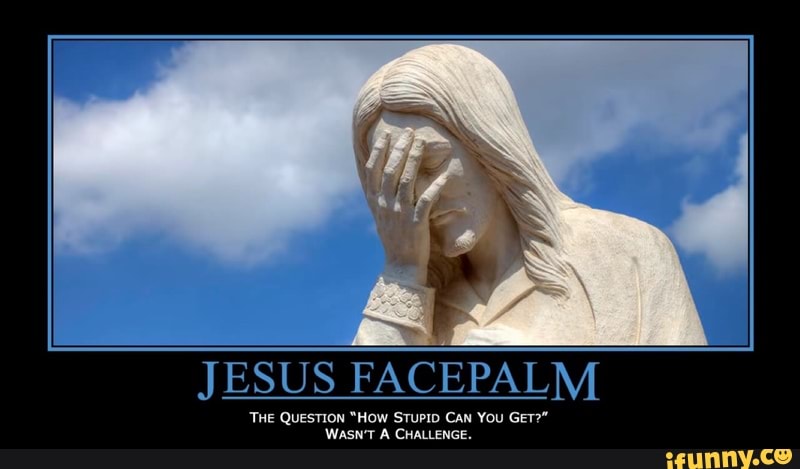I'm not going to copy them, I'm just going to link to them, mostly because I can't comment directly (something to do with my browser, I don't know, it's a pain in the a**, but otherwise....).
"Christianity is propaganda to make people passive"
Warmed over Nietzsche is not advancing the discussion one jot beyond the mid-19th century; especially if there isn't even a hint of a reference in the argument to Nietzsche, and I'm betting there wasn't. Discarded on sight.
Ah, the Greek/Barbarian argument, a/k/a "If they ain't like us, they ain't shit." Didn't Euripides mark "Paid" to that one with "Medea"? Guess word hasn't reached the on-line intelligentsia, huh? (Who will now consider me "elitist" for referencing a Greek play they've never read.) And isn't that, anyway, a little to kin to Trump's xenophobia for comfort these days? I guess not.
Question: if they were illiterate, who wrote it all down? Angels? Dancing on pin-heads?
Second question: you do understand the foundations of Western culture rest on the Greeks, who were shepherds, too; and the Hebrews? If you don't, stop talking; you're a clanging cymbal, although I'd call you can empty can. Either way, you're too ignorant to bother with.
As for Paul, no, he was not illiterate. But A) you think literacy was a universal condition before the 20th century? It wasn't. It was limited for centuries to scribes and, not coincidentally, later, to monks. Most people didn't need to read or write. They either paid someone to do it (as we still pay people to type letters and handle e-mail), or they didn't need it at all. Literacy was literally not universal until the 20th century, though it was rising in the 19th. Stop being such a blinkered moron that you think all things you take for granted were universal throughout time. Your ignorance is showing.
B) No, Paul was not illiterate, but he couldn't write. The two skills are not coterminous. Reading does not require the ability to write, anymore than reading requires you be able to type. It was well within my lifetime that professionals (lawyers, accountants, etc.) didn't type and didn't need to. That was a "menial" skill outsourced to clerks and secretaries. Why waste time with it? Such people could, of course, read, and write, but why bother with the latter? Dictate, as Paul did, to a scribe, and move on. The important question is: was Jesus of Nazareth literate? In Luke's version he obviously is. He is in the temple (this was before the destruction of the Temple in Jerusalem and the move toward modern Judaism and synagogues) teaching on the days lesson from Isaiah at one point. Luke is probably the most literate gospel writer of the four (his Greek is the best, though his grasp of Hebrew scriptures betrays a Gentile's knowledge). His Jesus reflets Luke's audience, which would be people like him. But would the son of a carpenter learn to read? Or write (he writes in the dirt in John's gospel, once.)? Why? Who would teach him, and what possible good would it do him? Ultimately this touches on the mystery of the incarnation (what did Jesus know and when did he know it?), but that's another matter.
Honestly, these things aren't difficult, if you would refrain from filling in the massive gaps in your knowledge with supposition and plastic wood. I'd have thought the gross example of Donald Trump would make the rest of us examine our own ignorance and be more interested in relieving it than in continuing it.
A gap in my knowledge I should have seen a long time ago, it turns out.

The anthropologist Franz Boaz once pointed out that the textual culture of hunting-gathering people tended to be much greater than their physical culture because you could make poetry, stories, etc. while you were doing other things, especially waiting for things to happen in your work. If is no surprise that that paperless culture would include philosophical and abstract thinking about things. It is ironic that people in the post-literate period, I'd call it"anti-thought," would express such false admiration for something they so pointedly don't much bother with as compared to pop-culture, of which the new atheism was completely made. The Greek word for "tragedy," or so I've read, means "goat song" which, reading about the etymology before I wrote this, seems to be of disputed origin. Which only makes the neo-atheist dismissal more cluelessly ironic. Good point about Media.
ReplyDeleteI'm not especially interested in the question of the literacy of Jesus because it's clear illiteracy would not necessarily have been damaging to his purpose. I can well imagine him being illiterate as well as a member of the lowest class - according to Roman stratification, Crossan says - a hobo preacher dependent on charity as an indication of his universality. I'm very impressed with Paul, I'm totally impressed by Jesus.